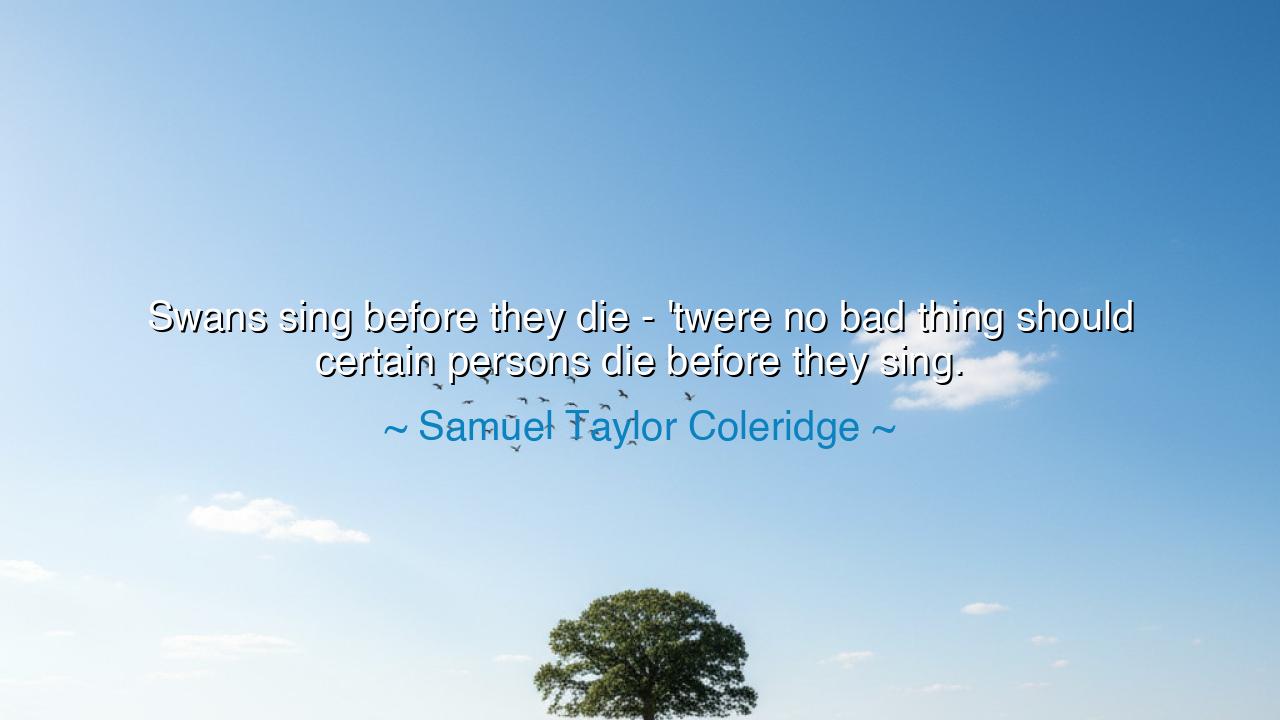
Swans sing before they die - 'twere no bad thing should certain
Swans sing before they die - 'twere no bad thing should certain persons die before they sing.






Hear, O seeker of wisdom, the words of Samuel Taylor Coleridge, poet of dreams and shadows: “Swans sing before they die—’twere no bad thing should certain persons die before they sing.” In this utterance, half jest and half thunder, Coleridge speaks both of beauty and of folly. He recalls the ancient belief that the swan, silent throughout its life, sings a final and haunting song at the moment of death. This swan-song became a symbol for the last, great expression of the soul, the noble outpouring that crowns a lifetime. Yet with biting irony, Coleridge adds: how much better if some men, whose voices bring not wisdom but vanity, were silenced before they ever attempted their song.
The origin of the first image lies deep in antiquity. The Greeks, with their love of myth, believed the swan to be sacred to Apollo, god of music and prophecy. It was said that as the bird faced death, it sang a final hymn, sweeter than all songs before. Plato spoke of it, Aeschylus hinted at it, and the poets of Rome repeated the tale. Thus, the swan-song came to signify the crowning work of poets, philosophers, or heroes before their end. But Coleridge, master of irony, takes this noble tradition and twists it, showing that not all men deserve a song—some ought never to raise their voices at all.
Consider the rulers of history who, before the hour of their downfall, poured out speeches of deceit or rage, seeking to justify themselves. Their “songs” were not like those of swans, but of crows, harsh and hollow. Think of Nero, who claimed to sing and play his lyre while Rome burned. His was no swan-song of beauty, but a mockery of music, remembered in scorn. Coleridge’s words cut through such vanity: would it not have been better if men like Nero had perished before they ever “sang,” sparing the world their false and destructive notes?
Yet the saying is not only mockery, but also warning. It reminds us that words are not harmless; they shape souls, guide nations, and linger long after the voice is silent. A song, once sung, cannot be unsung. And so Coleridge urges discernment: it is better to remain silent, even to the grave, than to unleash words that poison, deceive, or disgrace. The swan saves its song for the right moment, and in that moment it achieves beauty. Should not men learn the same restraint?
The meaning is clear: not every voice is worth raising, not every word is worth speaking. Some men should remain silent rather than fill the world with empty or harmful noise. Yet for the true poet, the true thinker, the true leader, there is honor in saving one’s greatest utterance for the moment when it matters most. A life’s final work, like the swan-song, should be beauty that endures, not clamor that is soon despised.
The lesson, then, is for every listener: weigh your words carefully. Speak not for vanity, but for truth. Save your strength for the moment when your voice can bring healing, wisdom, or beauty. Do not waste your breath on noise; instead, strive to make your song one worthy of memory. For silence is better than folly, and restraint is better than a careless voice.
Practical wisdom flows here: before you speak, ask if your words build or destroy. If they build, let them flow like a song; if they destroy, let silence be your offering. Train yourself in restraint, so that when your moment comes—whether in art, in counsel, or in farewell—you may sing as the swan sings: with grace, with dignity, with beauty.
So remember Coleridge’s sharp yet noble counsel: “Swans sing before they die—’twere no bad thing should certain persons die before they sing.” Laugh at its irony, but heed its warning. Let your life not end in noise, but in a final song that blesses the world. And if you cannot sing such a song, then hold your silence, and in that silence, perhaps, you will be wiser than those whose voices have dishonored them.






AAdministratorAdministrator
Welcome, honored guests. Please leave a comment, we will respond soon